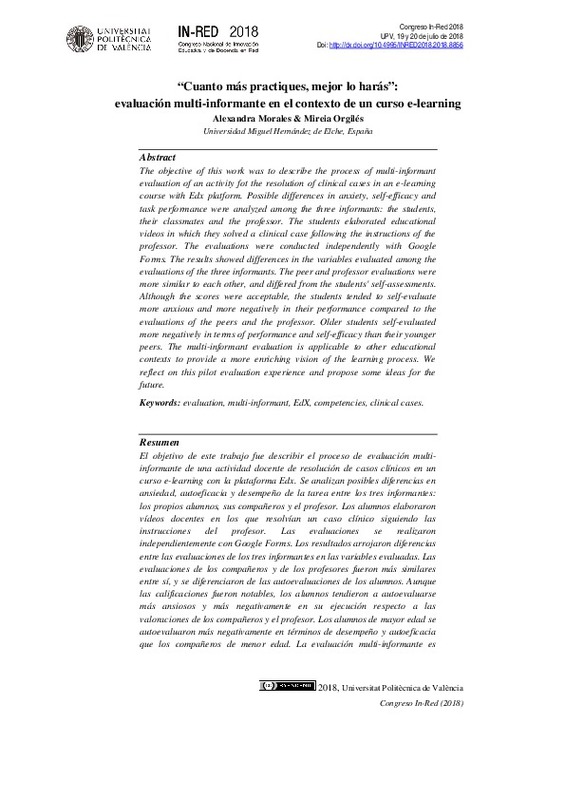JavaScript is disabled for your browser. Some features of this site may not work without it.
Buscar en RiuNet
Listar
Mi cuenta
Estadísticas
Ayuda RiuNet
Admin. UPV
“Cuanto más practiques, mejor lo harás”: evaluación multi-informante en el contexto de un curso e-learning
Mostrar el registro completo del ítem
Morales, A.; Orgilés, M. (2018). “Cuanto más practiques, mejor lo harás”: evaluación multi-informante en el contexto de un curso e-learning. En IN-RED 2018. IV Congreso Nacional de Innovación Educativa y Docencia en Red. Editorial Universitat Politècnica de València. 1024-1033. https://doi.org/10.4995/INRED2018.2018.8856
Por favor, use este identificador para citar o enlazar este ítem: http://hdl.handle.net/10251/113072
Ficheros en el ítem
Metadatos del ítem
| Título: | “Cuanto más practiques, mejor lo harás”: evaluación multi-informante en el contexto de un curso e-learning | |
| Autor: | Morales, Alexandra Orgilés, Mireia | |
| Fecha difusión: |
|
|
| Resumen: |
[EN] The objective of this work was to describe the process of multi-informant evaluation of an activity fot the resolution of clinical cases in an e-learning course with Edx platform. Possible differences in anxiety, ...[+]
[ES] El objetivo de este trabajo fue describir el proceso de evaluación multi-informante de una actividad docente de resolución de casos clínicos en un curso e-learning con la plataforma Edx. Se analizan posibles diferencias ...[+]
|
|
| Palabras clave: |
|
|
| Derechos de uso: | Reconocimiento - No comercial - Sin obra derivada (by-nc-nd) | |
| ISBN: |
|
|
| Fuente: |
|
|
| DOI: |
|
|
| Editorial: |
|
|
| Versión del editor: | http://ocs.editorial.upv.es/index.php/INRED/INRED2018/paper/view/8856 | |
| Título del congreso: |
|
|
| Lugar del congreso: |
|
|
| Fecha congreso: |
|
|
| Código del Proyecto: |
|
|
| Agradecimientos: |
|
|
| Tipo: |
|








